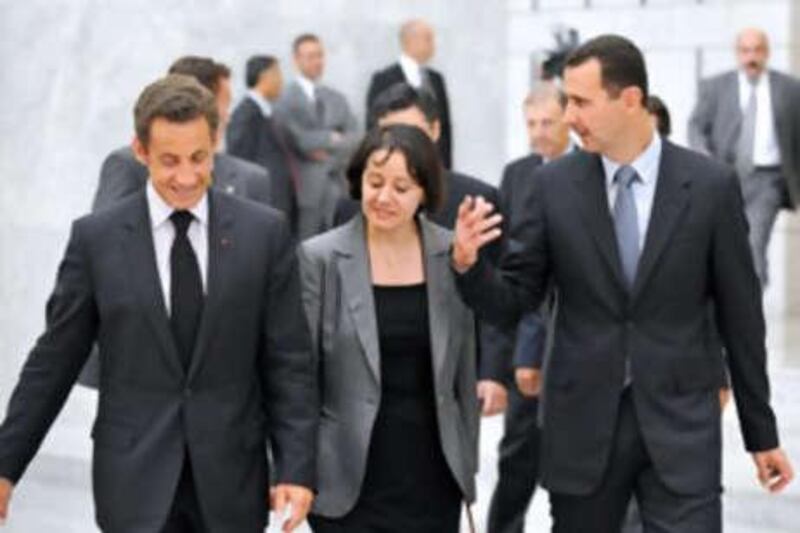DAMASCUS // Iran is taking a "major risk" with its ongoing nuclear programme, Nicolas Sarkozy, the French president, said yesterday, warning Tehran it faced an Israeli military strike unless it stopped uranium enrichment. The West accuses Iran of trying to develop nuclear weapons under the guise of a civilian power scheme. Iran insists it does not want an atom bomb, but both the United States and Israel have said a pre-emptive attack on Iranian nuclear targets is a possibility.
"Iran is taking a major risk in continuing the process to obtain a military nuclear capacity," Mr Sarkozy said in a meeting with the leaders of Syria, Turkey and Qatar in Damascus. "One day, whatever the Israeli government, we could find one morning that Israel has struck. "The question is not whether it would be legitimate, whether it would be intelligent. What will we do at that moment? It would be a catastrophe. We must avoid that catastrophe."
The French president was in Damascus for talks with his Syrian counterpart, Bashar Assad, a visit that confirmed years of Syrian diplomatic isolation from the West have ended. Syria is a close ally of Iran, and Mr Sarkozy said he hoped Damascus would use that relationship to help resolve the Iranian nuclear issue. A series of UN sanctions have been imposed on Iran over its refusal to suspend uranium enrichment, a process that can produce fuel for power plants or, potentially, nuclear weapons. Mr Assad, who has pushed for a nuclear-free Middle East, said he had raised the matter during a recent visit to Tehran and found Iranian officials also vowed their opposition to nuclear weapons. But he pledged to continue his dialogue on the matter to avert a war. "We hope to reach a resolution to this problem," Mr Assad said after meeting Mr Sarkozy. "No one in the world can bear the consequences of any non-peaceful resolution because it will be a catastrophe." The Syrian leader also revealed that a fifth round of indirect peace talks with Israel, mediated by Turkey, had been postponed and would not be resumed until Ehud Olmert, the Israel prime minister, who is being forced from office over a corruption scandal, has been replaced. The progress of peace talks and the prospect of direct negotiations would depend on who took over as Israeli premier this month, Mr Assad said. Syria and Israel have been at war for decades, and the last effort to end the conflict, in 2000, collapsed after Israel refused to completely withdraw from the Golan Heights, Syrian territory the Jewish state captured in 1967 and later illegally annexed. According to a report by Reuters, the French also used the trip to Damascus as an opportunity to hand Syrian officials a letter intended for Gilad Shalit, an Israeli soldier captured by Hamas two years ago. Syria and Qatar were asked to pass the letter to Khalid Meshaal, the Damascus-based leader of the Palestinian Islamic militant group. Yesterday's four-way talks mark a sharp turnabout in Syria's diplomatic fortunes. Recently shunned by the West - including France - international doors are reopening with the acknowledgement that Middle East peace is impossible without the support and participation of Damascus. The United States, however, continues an isolation policy against Syria, in part because of its support for Hizbollah and Hamas, and opposition to the American military presence in Iraq. @email:psands@thenational.ae





